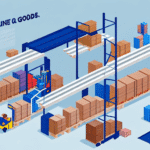Maximizing Efficiency in Ecommerce Logistics
The ecommerce landscape continues to expand at an unprecedented rate, necessitating efficient and streamlined logistics to remain competitive. Optimizing logistics operations—from order processing to last-mile delivery—is essential for providing fast, reliable delivery and enhancing customer satisfaction. This article explores comprehensive strategies and techniques to maximize efficiency in ecommerce logistics, supported by data and insights from reputable sources.
Reducing Order Processing Time
Automating Order Processing
Automation plays a pivotal role in accelerating order processing. Implementing automated systems can handle repetitive tasks, reduce human error, and speed up the overall process. According to a McKinsey report, automation can increase order processing speed by up to 70%, significantly improving turnaround times.
Utilizing Barcode Scanning
Barcode scanning technology enhances accuracy and efficiency in order picking. By quickly identifying and locating products, barcode systems reduce the time required to fulfill orders. This leads to faster processing times and fewer errors, ultimately enhancing customer satisfaction.
Training Staff for Efficiency
Well-trained staff are crucial for efficient order handling. Providing comprehensive training ensures that employees are proficient in using technology and following optimized workflows, which can further reduce order processing time.
Streamlining Shipping and Delivery Processes
Optimizing Packing and Labeling
Efficient packing and accurate labeling are essential for smooth shipping operations. Optimizing these processes minimizes delays and errors, ensuring that packages reach customers promptly. Implementing standardized packing procedures can also reduce shipping costs and improve handling efficiency.
Partnering with Reliable Carriers
Establishing strong partnerships with dependable shipping carriers is vital. Reliable carriers offer faster delivery options and better rates, allowing businesses to meet customer expectations effectively. Collaborating with carriers that have robust tracking systems can also enhance visibility and accountability in the shipping process.
Leveraging Advanced Shipping Software
Integrating advanced shipping software with ecommerce platforms can automate and streamline shipping tasks. Solutions like ShipStation offer features such as real-time tracking, automated label generation, and seamless integration with multiple carriers, thereby enhancing the overall shipping efficiency.
Effective Inventory and Warehouse Management
Implementing Inventory Management Software
Inventory management software provides real-time tracking of stock levels, optimizing inventory turnover and reducing the risk of stockouts. Tools like TradeGecko offer comprehensive solutions for forecasting demand, managing stock levels, and automating reordering processes.
Optimizing Warehouse Layout
An optimized warehouse layout facilitates faster order picking and reduces movement time. Strategically organizing products based on sales volume and category can enhance productivity and streamline the fulfillment process.
Adopting Barcode and RFID Systems
Integrating barcode and RFID systems into warehouse operations improves accuracy in inventory tracking and order fulfillment. These technologies enable quick identification and location of products, minimizing errors and enhancing overall efficiency.
Implementing Automated Systems
Automation in Order Fulfillment
Automated order fulfillment systems can handle large volumes of orders with minimal manual intervention. Technologies such as robotic pickers and automated sorting systems significantly speed up the fulfillment process and reduce labor costs.
Data Analytics for Process Optimization
Leveraging data analytics allows businesses to gain insights into their logistics operations. Analyzing data on order processing times, inventory turnover, and shipping performance helps identify bottlenecks and areas for improvement, leading to enhanced operational efficiency.
Integration with Customer Relationship Management (CRM)
Integrating automated systems with CRM platforms ensures a seamless flow of information between logistics and customer service teams. This integration facilitates better communication, enhances order tracking, and improves overall customer experience.
Enhancing Last-Mile Delivery
Utilizing GPS Tracking
GPS tracking provides real-time updates on delivery status, allowing businesses and customers to monitor shipments accurately. This transparency enhances trust and enables timely interventions in case of delays.
Collaborating with Local Delivery Partners
Partnering with local delivery services can improve delivery speed and reliability, especially in congested urban areas. Local partners often have better knowledge of the area, enabling more efficient route planning and faster deliveries.
Exploring Alternative Delivery Methods
Innovative last-mile delivery methods, such as bike couriers and drone deliveries, can offer faster and more cost-effective solutions. These alternatives are particularly effective in densely populated areas where traditional delivery methods may face challenges.
Ensuring Compliance and Risk Management
Adhering to Shipping Regulations
Compliance with shipping regulations is critical to avoid legal issues and ensure smooth operations. Staying updated with local and international shipping laws helps prevent delays and fines, maintaining the integrity of the supply chain.
Implementing Data Protection Measures
Protecting customer data is paramount in ecommerce logistics. Implementing robust data protection measures ensures compliance with regulations like GDPR, safeguarding customer privacy, and building trust.
Risk Mitigation Strategies
Developing risk mitigation strategies, such as diversifying suppliers and implementing contingency plans, helps businesses navigate disruptions in the supply chain. Proactive risk management ensures continuity and resilience in logistics operations.
Innovations and Future Trends
Adopting Artificial Intelligence
Artificial Intelligence (AI) is transforming ecommerce logistics by enabling predictive analytics, optimizing routing, and enhancing demand forecasting. AI-powered solutions improve decision-making and operational efficiency.
Blockchain for Supply Chain Transparency
Blockchain technology offers enhanced transparency and security in the supply chain. By providing a decentralized ledger of transactions, blockchain ensures data integrity and facilitates traceability of products from origin to delivery.
Exploring Drone and Autonomous Deliveries
Drone and autonomous delivery systems present the future of last-mile logistics. These technologies promise faster, more efficient deliveries, especially in remote or hard-to-reach areas, revolutionizing the logistics landscape.
Conclusion
Maximizing efficiency in ecommerce logistics requires a multifaceted approach that encompasses order processing, shipping, inventory management, automation, last-mile delivery, compliance, and embracing technological innovations. By implementing the strategies and techniques discussed, businesses can enhance operational efficiency, reduce costs, and deliver superior customer experiences. Staying agile and continuously optimizing logistics operations are key to thriving in the competitive ecommerce market.




















